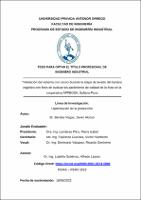Validación del sistema con ozono durante la etapa de lavado del banano orgánico con fines de evaluar los parámetros de calidad de la fruta en la cooperativa APPBOSA, Sullana- Piura

View/
Download
(application/pdf: 5.391Mb)
(application/pdf: 5.391Mb)
Date
2022Author(s)
Benites Vegas, Javier Alonso
Metadata
Show full item recordAbstract
La presente investigación tiene como objetivo validar el sistema con ozono
sistema de ozono durante la etapa de lavado del banano orgánico con fines de
evaluar los parámetros de calidad de la fruta en la cooperativa APPBOSA,
Sullana-Piura. El presente trabajo es descriptivo, donde se realizó un análisis
físico visual a la materia prima empleando la dosis óptima de ozono para proceder
a la evaluación de parámetros de calidad como color, textura, grados brix, peso.
Los resultados obtenidos son: analizar las características físicas / organolépticas
iniciales del banano orgánico al momento de emplear el tratamiento con dosis de
ozono. Realizar una comparación empleando unas muestras tratadas con el
sistema del ozono frente a otras muestras empleando el sistema tradicional de la
Cooperativa y así luego diferenciar los resultados obtenidos, verificar los
parámetros de calidad para ambos tratamientos con la finalidad de comparar con
el formato establecido por la misma Cooperativa, evaluar los parámetros finales
como textura, color, sabor y grados brix en relación a los parámetros de calidad
para la fruta ozonizada y para la fruta no ozonizada respectivamente. Finalmente
se obtuvo las siguientes conclusiones: el ozono por su capacidad gaseosa,
permitió eliminar la presencia de hongos fitopatógenos en la corona del banano,
inhibiendo de manera continua un crecimiento de microorganismos. La corona de
banano empleando el tratamiento con ozono se presentó de manera consistente,
seca y con ausencia de pudrición antes y después de su maduración en
comparación a la fruta del tratamiento tradicional. Para la presente investigación,
se empleó 2 métodos para la evaluación del tratamiento con ozono: método por
Inmersión y el método por Aspersión, la dosis óptima de ozono que se utilizó para
medir la cantidad exacta de O₃ en el agua del proceso, fue de 0.4 ppm/ min, esta
se midió con ayuda de un ozonómetro el día que estuvo presente personal de
Inka Ozono para proceder a la evaluación de un primer ensayo y se concluyó que
al comparar ambos tratamientos: tratamiento con ozono y tratamiento tradicional,
el ozono dió una mayor efectividad para la fruta. The objective of this research is to validate the system with ozone ozone system
during the washing stage of organic bananas in order to evaluate the quality
parameters of the fruit in the APPBOSA cooperative, Sullana-Piura. The present
work is descriptive, carrying out a visual physical analysis of the raw material using
the optimal dose of ozone to proceed to the evaluation of quality parameters such
as color, texture, brix degrees, etc. The results obtained are: to analyze the initial
physical / organoleptic characteristics of organic bananas at the time of using the
treatment with ozone doses. Make a comparison using some samples treated with
the ozone system against other samples using the traditional system of the
Cooperative and then differentiate the results obtained, verify the quality
parameters for both treatments in order to compare with the format established by
the Cooperative. same Cooperative, evaluate the final parameters such as texture,
color, flavor and brix degrees in relation to the quality parameters for the ozonated
fruit and for the non-ozonated fruit, respectively. Finally, the following conclusions
were obtained: ozone, due to its gaseous capacity, allowed to eliminate the
presence of phytopathogenic fungi in the banana crown, continuously inhibiting the
growth of microorganisms. The banana crown using the ozone treatment
presented consistently, dry and with no rot before and after its maturation
compared to the fruit of the traditional treatment. For the present investigation, 2
methods were used for the evaluation of the ozone treatment: the immersion
method and the spray method The optimal dose of ozone that was used to
measure the exact amount of O₃ in the process water was 0.4 ppm/min, this was
measured with the help of an ozonometer the day that Inka Ozono personnel were
present to proceed with the evaluation. of a first test and it was concluded that
when comparing both treatments: treatment with ozone and traditional treatment,
ozone gave a greater effectiveness for the fruit.
Subject
Collections
- Ingeniería Industrial [356]

